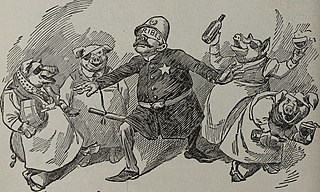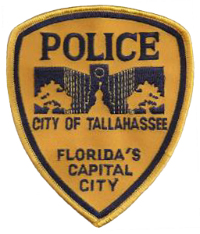
The Serious Organised Crime Agency (SOCA) was a non-departmental public body of the Government of the United Kingdom which existed from 1 April 2006 until 7 October 2013. SOCA was a national law enforcement agency with Home Office sponsorship, established as a body corporate under Section 1 of the Serious Organised Crime and Police Act 2005. It operated within the United Kingdom and collaborated with many foreign law enforcement and intelligence agencies.

Police corruption is a form of police misconduct in which law enforcement officers end up breaking their political contract and abusing their power for personal gain. This type of corruption may involve one or a group of officers. Internal police corruption is a challenge to public trust, cohesion of departmental policies, human rights and legal violations involving serious consequences. Police corruption can take many forms, such as: bribery, theft, sexual assault, and discrimination.
A law enforcement officer (LEO), or peace officer in North American English, is a public-sector or private-sector employee whose duties primarily involve the enforcement of laws, protecting life & property, keeping the peace, and other public safety related duties. Law enforcement officers are designated certain powers & authority by law to allow them to carry out their responsibilities.
The blue wall of silence, also blue code and blue shield, are terms used to denote the informal code of silence among police officers in the United States not to report on a colleague's errors, misconducts, or crimes, especially as related to police brutality in the United States. If questioned about an incident of alleged misconduct involving another officer, while following the code, the officer being questioned would perjure themselves by feigning ignorance of another officer's wrongdoing.

The Tallahassee Police Department (TPD) is the municipal police for that provides public safety services for the city of Tallahassee, Florida, United States. Within the department, there are twelve primary divisions: The Chief of Police, Internal Affairs, Development Bureau, Investigations, Traffic Enforcement, Crime Analysis Unit, Public Information Office, Towing Administration, Property & Evidence, Operations Bureau, Technology, Records, and Special Operations.
Police misconduct is inappropriate conduct and illegal actions taken by police officers in connection with their official duties. Types of misconduct include among others: sexual offences, coerced false confession, intimidation, false arrest, false imprisonment, falsification of evidence, spoliation of evidence, police perjury, witness tampering, police brutality, police corruption, racial profiling, unwarranted surveillance, unwarranted searches, and unwarranted seizure of property.

As of 2020, more than 800,000 sworn law enforcement officers have been serving in the United States. About 137,000 of those officers work for federal law enforcement agencies.

The NYC Civilian Complaint Review Board (CCRB) is a civilian oversight agency with jurisdiction over the New York City Police Department (NYPD), the largest police force in the United States. A board of the Government of New York City, the CCRB is tasked with investigating, mediating and prosecuting complaints of misconduct on the part of the NYPD. Its regulations are compiled in Title 38-A of the New York City Rules.
Law enforcement in Albania is the responsibility of several agencies. The responsibility for most tasks lies with the Albanian State Police, a national police agency, which is under the authority of Ministry of Internal Affairs. Examples of other agencies with limited policing powers are the Municipal Police, which has administrative functions and operates in the local level. They are controlled by mayors.
Police accountability involves holding both individual police officers, as well as law enforcement agencies responsible for effectively delivering basic services of crime control and maintaining order, while treating individuals fairly and within the bounds of law. Police are expected to uphold laws, regarding due process, search and seizure, arrests, discrimination, as well as other laws relating to equal employment, sexual harassment, etc. Holding police accountable is important for maintaining the public's "faith in the system". Research has shown that the public prefers independent review of complaints against law enforcement, rather than relying on police departments to conduct internal investigations. There is a suggestion that such oversight would improve the public's view on the way in which police officers are held accountable.

In many countries, particularly those with a federal system of government, there may be several law enforcement agencies, police or police-like organizations, each serving different levels of government and enforcing different subsets of the applicable law.
The Columbia Police Department (CPD) is the principal law enforcement agency serving the city of Columbia, Missouri in the United States. It protects a metropolitan population of nearly 127,000 with 187 sworn police officers.

The New York City Department of Investigation (DOI) is a law enforcement agency of the government of New York City that has been referred to by some observers as New York City's "secret police" because its investigations are confidential and its investigators are not uniformed.
Civilian oversight, sometimes referred to as civilian review or citizen oversight, is a form of civilian participation in reviewing government activities, most commonly accusations of police misconduct. Members of civilian oversight boards are generally not employed by the government entity which they are reviewing. These groups are tasked with direct involvement in the citizen complaints process and develop solutions to improve government accountability. Responsibilities of civilian oversight groups can vary significantly depending on the jurisdiction and their ability to become influential. Oversight should not simply criticize but should improve government through citizen support for government responsiveness, accountability, transparency, and overall efficiency.

The Independent Investigations Office (IIO) is the civilian oversight agency in British Columbia, Canada responsible for examining and investigating incidents involving on or off duty municipal police officers, Stl’atl’imx Tribal Police Service, Metro Vancouver Transit Police, Royal Canadian Mounted Police officers based in BC, Special Provincial Constables, Special Municipal Constables as well as Auxiliary & Reserve Constables that result in death or serious harm.
The Alberta Serious Incident Response Team is the civilian oversight agency in Alberta, Canada responsible for the investigation of incidents resulted in serious injury or death to any person, as well as serious or sensitive allegations of police misconduct. ASIRT has jurisdiction over all municipal police officers and Royal Canadian Mounted Police "K" Division officers, and for all complaints whether on or off duty related.
The Independent Investigation Unit is the civilian oversight agency in Manitoba, Canada responsible for the investigation of incidents resulted in serious injury or death to any person. IIU has jurisdiction over all municipal police officers, First Nations police officers and Royal Canadian Mounted Police "D" Division officers, for all complaints on or off duty related.

The Office of the Independent Police Review Director is an independent civilian oversight agency that handles public complaints regarding police conduct in the Canadian province of Ontario. The agency oversees municipal police services and the Ontario Provincial Police.
The Independent Office for Police Conduct (IOPC) is a non-departmental public body in England and Wales which, since 8 January 2018, is responsible for overseeing the system for handling complaints made against police forces in England and Wales. Most allegations of police misconduct are investigated by police forces' own professional standards departments. However the IOPC does conduct independent investigations of serious allegations of misconduct or criminal offences by police officers and other law enforcement officers. 'Mandatory' referrals are usually made to the IOPC should a person die or sustain serious injuries following police contact. Additionally, a force's professional standards department may also make a 'voluntary' referral – in which a force will ask the IOPC to consider if they wish to investigate independently, supervise a force professional standards investigation, or decline and refer the investigation back to the force to investigate without any IOPC input. The office received over 4300 referrals from police forces and completed about 700 investigations in the 2019/20 year.
The Law Enforcement Conduct Commission oversights, monitors and investigates allegations of serious misconduct by the NSW Police Force (NSWPF) and NSW Crime Commission (NSWCC). It was set up on 1 July 2017 to replace the Police Integrity Commission and the Police and Compliance Branch of the Office of the Ombudsman








